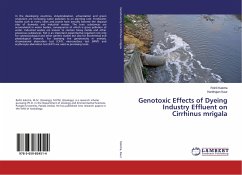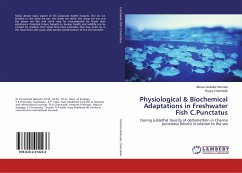
Toxicity of Textile Effluent in Freshwater FishCirrhinus Mrigala
Versandkostenfrei!
Versandfertig in 1-2 Wochen
26,99 €
inkl. MwSt.

PAYBACK Punkte
13 °P sammeln!
In this investigation the observed epithelial necrosis and desquamation of the gill epithelium of fish Cirrhinus Mrigala exposed to textile effluent toxicity are direct response induced by the action of effluent. Gill hyperplasia might serve as a defensive mechanism leading to decrease in the respiratory surface and an increase in the toxicant blood diffusion distance. Histological damage to gill surface by effluent is attributed to high accumulation in gills, irritation due to elevated mucous secretion, increase ventilation volume and decreased gill oxygen uptake efficiency. The severe destru...
In this investigation the observed epithelial necrosis and desquamation of the gill epithelium of fish Cirrhinus Mrigala exposed to textile effluent toxicity are direct response induced by the action of effluent. Gill hyperplasia might serve as a defensive mechanism leading to decrease in the respiratory surface and an increase in the toxicant blood diffusion distance. Histological damage to gill surface by effluent is attributed to high accumulation in gills, irritation due to elevated mucous secretion, increase ventilation volume and decreased gill oxygen uptake efficiency. The severe destruction of hepatic cells and formation of inter cellular spaces in liver of effluent treated fish could be possibly due to sudden withdraw and utilization of stored glycogen from the liver cells of fish to meet the energy demand during effluent stress. In this investigation the high incidence of cytoplasmic vacuolation, association with granular and hyaline droplet degeneration and necrosis in the proximal and distal tubules characterize degeneration changes in the renal tissues, normally related to the presence of effluent in the filtrate from the glomerulus.












